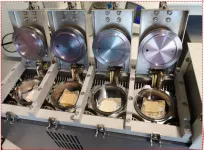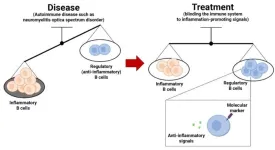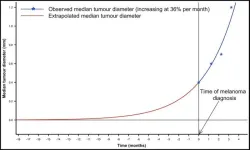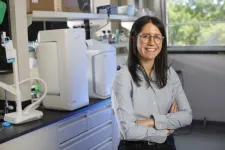(Press-News.org) In low- and middle-income countries, anemia reduction efforts are often touted as a way to improve educational outcomes and reduce poverty. A new study, co-authored by a global health economics expert from the University of Notre Dame, evaluates the relationship between anemia and school attendance in India, debunking earlier research that could have misguided policy interventions.
Santosh Kumar, associate professor of development and global health economics at Notre Dame’s Keough School of Global Affairs, is co-author of the study, published in Communications Medicine. Kumar’s research explores the intersection of global health and poverty reduction. His latest work evaluates the relationship between anemia and school attendance in India.
The study investigated whether there was a link between anemia and school attendance in more than 250,000 adolescents ages 15 to 18. Earlier observational studies have shown a link between anemia and attendance, even after accounting for variables such as gender and household wealth, according to Kumar. But the new study, which applied more rigorous econometric statistical analysis, did not find such a link, he said.
“Most previous research on this topic has used conventional study designs or focused on small geographical areas, which limits its policy relevance,” Kumar said. “Earlier estimates may have been distorted by unobserved household factors related to both anemia and school attendance. So in this study, we focused on the relationship between anemia and attendance among adolescents who were living in the same household.
“Ultimately,” Kumar said, “we found that the link between anemia and schooling is more muted than previously suggested by studies that did not consider household-level factors.”
The findings have important implications for policymakers seeking to improve education in low- and middle-income countries like India, Kumar said. India has widespread school attendance issues and struggles with health conditions such as anemia caused by iron deficiency, particularly in children and adolescents. The country has pushed to improve educational outcomes, in keeping with the United Nations’ Sustainable Development Goals, Kumar said. But to achieve that, he said, more research is needed to pinpoint an evidence-based intervention.
This study is part of an ongoing project to do that work and was co-authored with Jan-Walter De Neve of the University of Heidelberg, Omar Karlsson of Lund University in Sweden, Rajesh Kumar Rai of Harvard University and Sebastian Vollmer of the University of Göttingen. The project received funding from the Alexander von Humboldt Foundation, the Swedish Research Council and the West Bengal State Department of Health and Family Welfare in India.
The latest study builds on an earlier one in which Kumar and fellow researchers helped evaluate the results of an iron fortification school lunch program for students ages 7 and 8 in India. That study showed that fortification reduced anemia but did not affect students’ performance in school. A forthcoming study, set to launch in summer 2024, will look at iron fortification for children ages 3 to 5. The research hypothesis is that an early-age nutritional intervention among preschoolers would make a significant impact on physical and cognitive development.
“Our findings have implications for policymakers who want to improve educational outcomes and reduce poverty,” Kumar said. “Effective policies are based on evidence. We need more rigorous statistical analysis to examine the causal relationship between anemia and education.
“This work ties into my larger research agenda, which explores the intersection of global health and poverty reduction. I want to use my academic research to support human dignity by helping to identify evidence-based health policies that will make a tangible difference in people’s lives.”
Contact: Tracy DeStazio, associate director of media relations, 574-631-9958 or tdestazi@nd.edu
END
Rigorous new study debunks misconceptions about anemia, education
By Josh Stowe
2024-06-18
ELSE PRESS RELEASES FROM THIS DATE:
Existing high blood pressure drugs may prevent epilepsy, Stanford Medicine-led study finds
2024-06-18
A class of drugs already on the market to lower blood pressure appears to reduce adults’ risk of developing epilepsy, Stanford Medicine researchers and their colleagues have discovered. The finding comes out of an analysis of the medical records of more than 2 million Americans taking blood pressure medications.
The study, published June 17 in JAMA Neurology, suggests that the drugs, called angiotensin receptor blockers, could prevent epilepsy in people at highest risk of the disease, ...
ACM recognizes innovators who solve real world problems
2024-06-18
ACM, the Association for Computing Machinery, today announced the recipients of four prestigious technical awards. These four awards in diverse categories celebrate the hard work and creativity which underpin many of today’s most important technologies.
Prateek Mittal, Princeton University, is the recipient of the 2023 ACM Grace Murray Hopper Award for foundational contributions to safeguarding Internet privacy and security using a cross-layer approach.
The unifying theme in Mittal’s ...
Wooden surfaces may have natural antiviral properties
2024-06-18
Viruses, including the coronavirus that causes COVID-19, can get passed from person to person via contaminated surfaces. But can some surfaces reduce the risk of this type of transmission without the help of household disinfectants? As reported in ACS Applied Materials & Interfaces, wood has natural antiviral properties that can reduce the time viruses persist on its surface — and some species of wood are more effective than others at reducing infectivity.
Enveloped viruses, like the coronavirus, can live up to five days on surfaces; nonenveloped viruses, including enteroviruses linked to the common cold, can live for weeks, in some cases even if the ...
For sustainable livestock farming bordering the Amazon Rainforest, look to the women
2024-06-18
When trees and livestock compete for land, the trees usually lose. It doesn’t have to be this way. But centrally designed plans to implement tree-livestock coexistence in deforested areas don’t always work on faraway farmland.
The ineffectiveness can be due to trying to accomplish too much too quickly. Transforming hundreds of thousands of hectares of treeless or degraded pastures into sustainable landscapes for livestock, nature and people should be a gradual, low-disruption process. And it should start ...
Dr. Felice J. Levine to step down as AERA Executive Director in June 2025
2024-06-18
AERA President Janelle T. Scott and Executive Director Felice J. Levine issued the following joint letter on June 18, 2024.
Dear AERA Members, Colleagues in the Field, and Leaders in Research and Education:
We are writing this joint letter to announce that Felice has decided to step down as Executive Director (ED) effective June 15, 2025. As she entered her fifth consecutive term, she signaled that she wished to move to an Emerita status next June and would not seek a further term of office. We both want to communicate this news now to provide sufficient lead time to conduct a search and ensure a smooth transition.
As ...
Treatment for autoimmune disorder acts on balance of immune cell types
2024-06-18
Autoimmune diseases cannot currently be cured, only treated, and this is also true for neuromyelitis optica spectrum disorder, which affects the central nervous system. A Kobe University study of how the treatment acts on the immune system shows that it shifts the balance of types of immune cells. This finding may represent a step toward the development of personalized medicine for autoimmune diseases.
An autoimmune disease is the body’s immune system turning against parts of the body itself. Neuromyelitis optica disorder spectrum, or NMOSD, is one of them and it causes inflammation of the central nervous system, leading to vision and sensory loss, weakness ...
Anti-inflammatory drug celecoxib could reduce risk of colon cancer recurrence for a subset of patients
2024-06-18
Boston – An analysis of data from a randomized clinical trial for patients with stage 3 colon cancer found that those with PIK3CA mutations who took celecoxib, an anti-inflammatory drug, after surgery lived significantly longer and had longer disease-free survival compared to those without the mutation. The study, highlighting a potential breakthrough in personalized cancer treatment, was led by clinical investigators at Dana-Farber Cancer Institute and Brigham and Women’s Hospital.
These findings are ...
Social inequalities widen after a breast cancer
2024-06-18
When it comes to health, inequalities can be seen at every level for women with breast cancer: prevention, screening, diagnosis, treatment, and survival. But what about their quality of life? A team from the University of Geneva (UNIGE), the University Hospitals of Geneva (HUG), Inserm, and Gustave Roussy has tracked nearly 6,000 women diagnosed with breast cancer over a 2-year period, showing that socioeconomic status has a major and lasting impact on their quality of life, despite identical medical treatment. These results from the UNICANCER-sponsored CANTO study, published in the Journal of Clinical Oncology, call ...
When does a melanoma metastasize? Implications for management
2024-06-18
“[...] immunotherapy is more likely to be effective at eliminating metastatic disease if the tumor burden is low, making it more logical to treat patients with high-risk melanomas at the earliest possible time [...]”
BUFFALO, NY- June 18, 2024 – A new research perspective was published in Oncotarget's Volume 15 on June 13, 2024, entitled, “When does a melanoma metastasize? Implications for management.”
In this new perspective, researchers John F. Thompson and Gabrielle J. Williams from The University of Sydney, Royal Prince Alfred Hospital, and the University ...
Allison Lopatkin named 2024 Pew Scholar in Biomedical Sciences
2024-06-18
Allison Lopatkin ’13, an assistant professor of chemical engineering, biomedical engineering, and microbiology and immunology at the University of Rochester, is one of 22 scientists selected to join the Pew Scholars Program in the Biomedical Sciences this year. The program provides early-career scientists four years of funding to explore some of the most pressing questions in human health and medicine.
The funding will help Lopatkin’s lab explore how changes in bacterial metabolism contribute to the development of antibiotic resistance. She says that decades of antibiotic overuse—in both clinical and agricultural ...
LAST 30 PRESS RELEASES:
Scientists show how to predict world’s deadly scorpion hotspots
ASU researchers to lead AAAS panel on water insecurity in the United States
ASU professor Anne Stone to present at AAAS Conference in Phoenix on ancient origins of modern disease
Proposals for exploring viruses and skin as the next experimental quantum frontiers share US$30,000 science award
ASU researchers showcase scalable tech solutions for older adults living alone with cognitive decline at AAAS 2026
Scientists identify smooth regional trends in fruit fly survival strategies
Antipathy toward snakes? Your parents likely talked you into that at an early age
Sylvester Cancer Tip Sheet for Feb. 2026
Online exposure to medical misinformation concentrated among older adults
Telehealth improves access to genetic services for adult survivors of childhood cancers
Outdated mortality benchmarks risk missing early signs of famine and delay recognizing mass starvation
Newly discovered bacterium converts carbon dioxide into chemicals using electricity
Flipping and reversing mini-proteins could improve disease treatment
Scientists reveal major hidden source of atmospheric nitrogen pollution in fragile lake basin
Biochar emerges as a powerful tool for soil carbon neutrality and climate mitigation
Tiny cell messengers show big promise for safer protein and gene delivery
AMS releases statement regarding the decision to rescind EPA’s 2009 Endangerment Finding
Parents’ alcohol and drug use influences their children’s consumption, research shows
Modular assembly of chiral nitrogen-bridged rings achieved by palladium-catalyzed diastereoselective and enantioselective cascade cyclization reactions
Promoting civic engagement
AMS Science Preview: Hurricane slowdown, school snow days
Deforestation in the Amazon raises the surface temperature by 3 °C during the dry season
Model more accurately maps the impact of frost on corn crops
How did humans develop sharp vision? Lab-grown retinas show likely answer
Sour grapes? Taste, experience of sour foods depends on individual consumer
At AAAS, professor Krystal Tsosie argues the future of science must be Indigenous-led
From the lab to the living room: Decoding Parkinson’s patients movements in the real world
Research advances in porous materials, as highlighted in the 2025 Nobel Prize in Chemistry
Sally C. Morton, executive vice president of ASU Knowledge Enterprise, presents a bold and practical framework for moving research from discovery to real-world impact
Biochemical parameters in patients with diabetic nephropathy versus individuals with diabetes alone, non-diabetic nephropathy, and healthy controls
[Press-News.org] Rigorous new study debunks misconceptions about anemia, educationBy Josh Stowe







